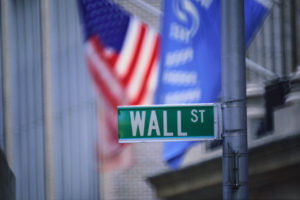U.S. pension funds sue Goldman, JPMorgan, others over stock lending market

Wall Street Sign Manhattan, New York, New York, USA. Image: http://www.market-barometer.com/wall_street_pic_001.jpg
(Reuters) – Three U.S. pension funds sued six of the world’s largest banks on Thursday, including Goldman Sachs Group Inc (GS.N) and JP Morgan Chase & Co (JPM.N), accusing them of conspiring to stifle competition in the more than $1 trillion stock lending market.
In the lawsuit filed in a Manhattan federal court, the funds accused the banks of boycotting start-up lending platforms by threatening and intimidating their potential clients. The defendants include Bank of America Corp (BAC.N), Credit Suisse AG CSAG.UL, Morgan Stanley (MS.N), UBS AG (UBSG.S), Goldman and JP Morgan.
The Iowa Public Employees’ Retirement System, Orange County Employees’ Retirement System and Sonoma County Employees’ Retirement Association said in the lawsuit that the banks have cornered the market on stock lending in violation of federal antitrust law.
“Through various improper means, the likes of Goldman Sachs and Morgan Stanley have for years colluded to maintain their power over this little-known-but-lucrative corner of Wall Street,” said Michael Eisenkraft, a lawyer for the funds and partner with Cohen Milstein.
Representatives of Bank of America, Goldman Sachs and JPMorgan declined to comment. The other banks did not immediately respond to requests for comment.
The pension funds said collusion by the banks harms investors and retirees by forcing them to pay high fees to engage in stock lending.
Stock lending is related to short selling and involves lending a stock to an investor or firm through a broker or dealer. Pension funds and other institutional investors frequently lend stock to hedge funds.
In short selling, a security that is not owned or has been borrowed is sold with the idea that it can be bought at a future date at a lower price.
The funds claimed in the lawsuit that the defendants conspired to take down upstart stock lending platforms AQS, which was developed by Quadriserv Inc, and SL-x, which would have allowed lenders and borrowers to interact directly.
The lawsuit claimed that in 2012 Goldman Sachs threatened to stop doing business with Bank of New York (BNY) Mellon if it continued to support the AQS platform and that the bank agreed to stop using it. BNY Mellon declined to comment.
The lawsuit said that through a joint project called EquiLend LLC, the banks purchased SL-x’s intellectual property and shelved it, according to the lawsuit. The funds accused the banks of establishing EquiLend in 2001 to safeguard their interests in the stock lending market.
A spokesman for EquiLend, which is also named as a defendant in the lawsuit, declined to comment.
In: reuters
